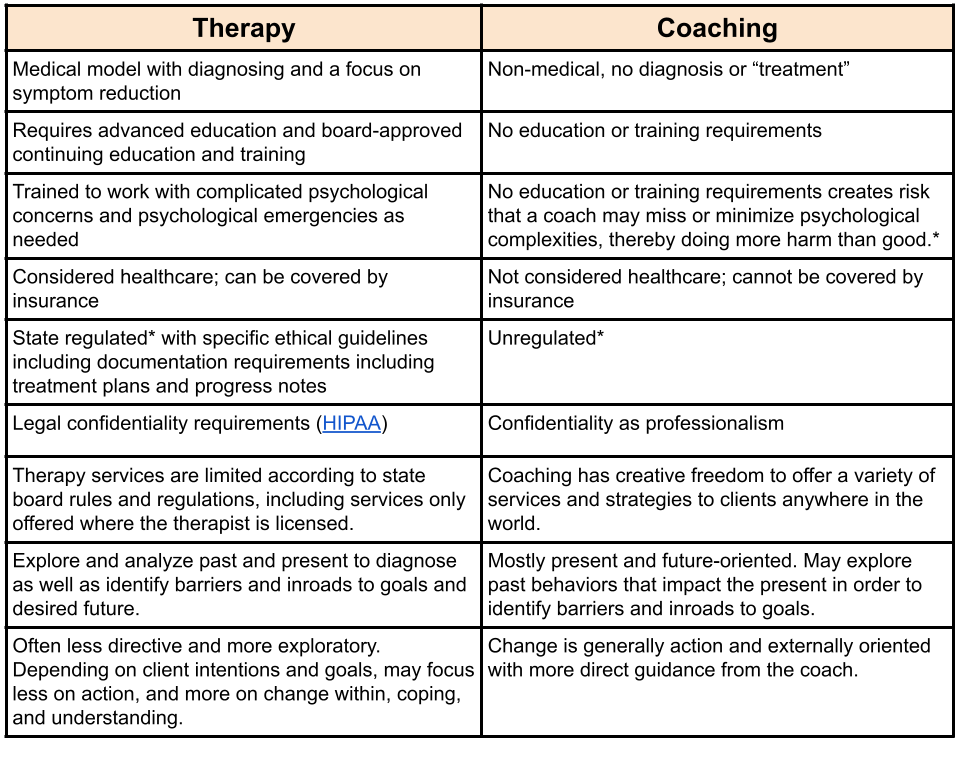Some might say I'm sowing way more than I'll be able to reap with this post, but they probably won't be using a garden analogy. Maybe I'm biting off more than I can chew? In over my head? Maybe some will say I'm just flat out wrong, with no analogy in which to couch that take. Plenty of others may wholeheartedly agree with me, and others will be somewhere in the middle. Honestly, there's no shortage of debate around this topic, particularly in the clinical community. So, I've started with a simple chart that summarizes what I understand to be the arguably inarguable consensus around the two; some will still, no doubt, argue. After that, you get my personal and professional take as both a therapist and a relationship coach.
Before you keep reading below, take a gander at the chart.
*Regulated (therapy) vs unregulated (coaching) pros and cons:
Therapists are mandated to keep specific records for a specific period of time that extends past a client's termination date (seven years in Texas and Oregon). Some clients need these clinical records and diagnoses when applying for disability, seeking some types of medical care and/or insurance reimbursement, or needing clinically relevant information to support a court case. Legally, these records are also the client's medical record, not solely the therapist's or the state's, so a client may also request and be granted a copy of those records at any time.
A regulated license also gives clients who believe that their therapist has behaved unprofessionally a resource to file a complaint with the therapist’s state licensing board. That board has the power to investigate and discipline licensees as needed. The state also has the broad authority to request and audit confidential documentation of its own volition. Insurance companies often require shared documentation, as well, in order to determine medical necessity, from which they decide whether or not they will pay for services. Whether you consider all of this a pro or con may depend on whether or not you believe the state and/or your insurnace company will function in your favor. The same goes for court subpoenas.
Coaching, on the other hand, while it is a legitimate and growing professional field in my opinion, is not regulated by any legal authority or official board, so there are no documentation requirements and no official measures in place to address professional or ethical complaints. Again, whether or not you consider this a pro or a con will depend on your personal experiences, needs, and preferences.
Maybe we can think of it like a physical therapist (parallel with a clinical mental health therapist) vs a personal trainer (parallel with a life coach). The physical therapist will have years of advanced education and training as well as intake documentation and ongoing notes for every visit to record medical necessity and progress; they center healing from injury that gets in the way of strength and functionality. A personal trainer may or may not have any kind of advanced education, training, or certifications, and they might just have you provide as little as basic demographic information and sign a waiver (and even that's an assumption; some might not!); they center strength, agility, speed, and motivation. Additionally, similar to therapists and coaches, a PT can apply their knowledge to be a personal trainer, while a personal trainer cannot also be a PT.
*The potential for harm:
If you kick a rock, you're likely to hit a licensed therapist with big opinions and bad feelings about the coaching industry. And, it's understandable. Being the unregulated field that it is, coaches can claim all sorts of expertise and make promises they can't back up. As a therapist, I've known life coaches who eventually got the clinical education and training to start offering therapy, and they reflected on their coaching practice with a cringe; they hadn't known what they didn't know. Back to the PT/trainer analogy: A trainer that is not also a PT runs a huge risk of missing, minimizing, and thereby exacerbating injuries they don't understand. An unqualified trainer also runs the additional greater risk of causing injuries that weren't already present.






